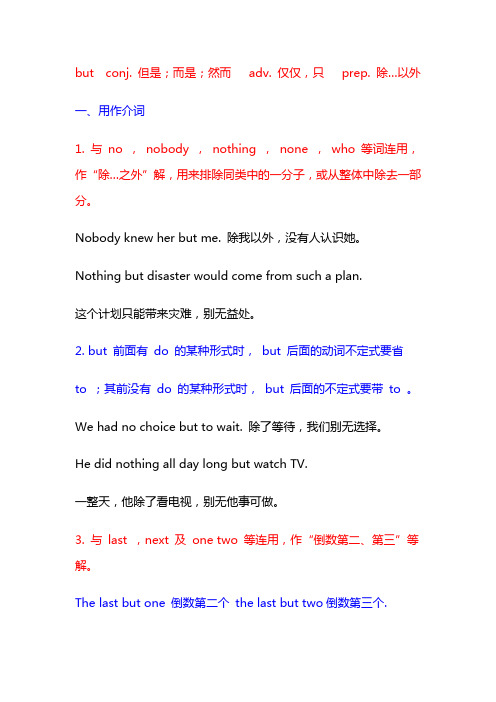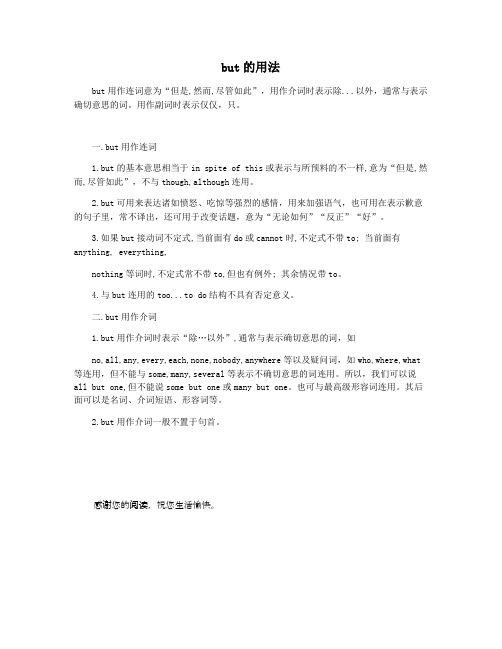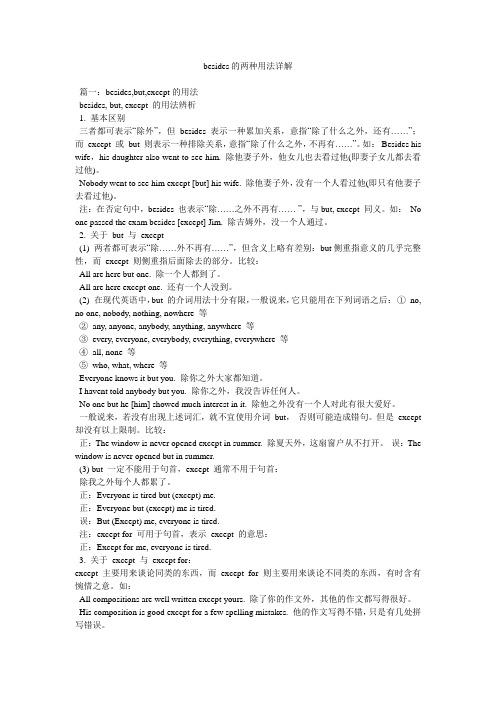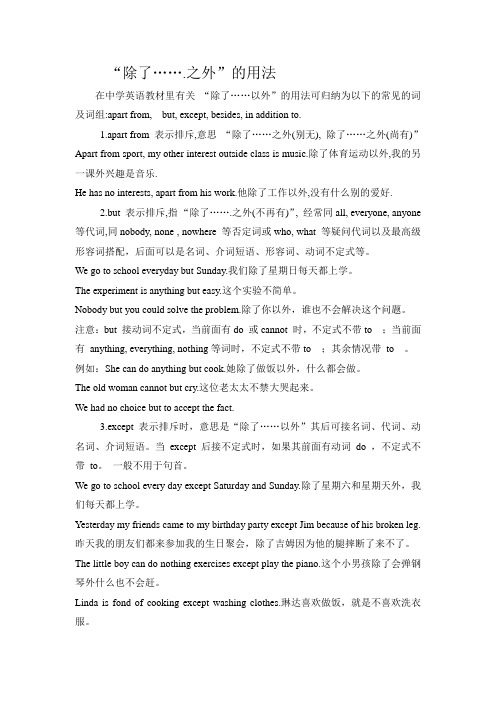no but的用法
but_的用法大全!!

but conj. 但是;而是;然而adv. 仅仅,只prep. 除…以外一、用作介词1. 与no ,nobody ,nothing ,none ,who 等词连用,作“除…之外”解,用来排除同类中的一分子,或从整体中除去一部分。
Nobody knew her but me. 除我以外,没有人认识她。
Nothing but disaster would come from such a plan.这个计划只能带来灾难,别无益处。
2. but 前面有do 的某种形式时,but 后面的动词不定式要省to ;其前没有do 的某种形式时,but 后面的不定式要带to 。
We had no choice but to wait. 除了等待,我们别无选择。
He did nothing all day long but watch TV.一整天,他除了看电视,别无他事可做。
3. 与last ,next 及one two 等连用,作“倒数第二、第三”等解。
The last but one 倒数第二个the last but two倒数第三个.Jack was the last but one to arrive. 杰克是倒数第二个到达的。
The next but one下一个的下一个He lives in the next house but one.他住在隔壁再过去一家。
Please inform the next but one in the list to get ready for the oral exam.请通知名单上的下下一名作好口试的准备。
二、用作副词1. 意思上相当于only ,后面跟名词或动词。
Tom is but a child. 汤姆只是个孩子。
We can but try now. 我们现在只有尝试一遍。
1. but for =without ,意为“要不是;如果没有”,意思上相当于一个虚拟条件句。
but 用法小结

but 的常用搭配
• But for 要不是 But for your help, I wouldn’t have finished it so easily. But for you, we couldn’t have carried out the ne but he knew it. • 除了他没有人知道这件事。
除..以外
2.用作介词,除了,除…之外
• I have had nothing but bad news lately. • I have no friends but her.
3. adv. 主要有两种用法
but用法小结
1. but 用作连词
He is young but very experienced. She is American but she lives in England. He tried to save it, but in vain.
但是,却
My bag is not black but brown.
• Not that…but that…不是因为…而是因为… Not that I dislike it, but(that) I haven’t enough money for it. Nothing but 只不过 I know nothing but this. Anything but 绝不是 It’s anything but bad. 这绝不是什么坏事。
but的用法

but的用法
but用作连词意为“但是,然而,尽管如此”,用作介词时表示除...以外,通常与表示确切意思的词。
用作副词时表示仅仅,只。
一.but用作连词
1.but的基本意思相当于in spite of this或表示与所预料的不一样,意为“但是,然而,尽管如此”,不与though,although连用。
2.but可用来表达诸如愤怒、吃惊等强烈的感情,用来加强语气,也可用在表示歉意的句子里,常不译出,还可用于改变话题,意为“无论如何”“反正”“好”。
3.如果but接动词不定式,当前面有do或cannot时,不定式不带to; 当前面有anything, everything,
nothing等词时,不定式常不带to,但也有例外; 其余情况带to。
4.与but连用的too...to do结构不具有否定意义。
二.but用作介词
1.but用作介词时表示“除…以外”,通常与表示确切意思的词,如
no,all,any,every,each,none,nobody,anywhere等以及疑问词,如who,where,what 等连用,但不能与some,many,several等表示不确切意思的词连用。
所以,我们可以说
all but one,但不能说some but one或many but one。
也可与最高级形容词连用。
其后面可以是名词、介词短语、形容词等。
2.but用作介词一般不置于句首。
感谢您的阅读,祝您生活愉快。
besides的两种用法详解参考

besides的两种用法详解篇一:besides,but,except的用法besides, but, except 的用法辨析1. 基本区别三者都可表示“除外”,但besides 表示一种累加关系,意指“除了什么之外,还有……”;而except 或but 则表示一种排除关系,意指“除了什么之外,不再有……”。
如:Besides his wife,his daughter also went to see him. 除他妻子外,他女儿也去看过他(即妻子女儿都去看过他)。
Nobody went to see him except [but] his wife. 除他妻子外,没有一个人看过他(即只有他妻子去看过他)。
注:在否定句中,besides 也表示“除……之外不再有…… ”,与but, except 同义。
如:No one passed the exam besides [except] Jim. 除吉姆外,没一个人通过。
2. 关于but 与except(1) 两者都可表示“除……外不再有……”,但含义上略有差别:but侧重指意义的几乎完整性,而except 则侧重指后面除去的部分。
比较:All are here but one. 除一个人都到了。
All are here except one. 还有一个人没到。
(2) 在现代英语中,but 的介词用法十分有限,一般说来,它只能用在下列词语之后:①no, no one, nobody, nothing, nowhere 等②any, anyone, anybody, anything, anywhere 等③every, everyone, everybody, everything, everywhere 等④all, none 等⑤who, what, where 等Everyone knows it but you. 除你之外大家都知道。
but的用法

二、用作介词1. 与no ,nobody ,nothing ,none ,who 等词连用,作“除……之外”Nothing but disaster would come from such a plan.这个计划只能带来灾难,别无益处。
2. We had no choice but to wait. 除了等待,我们别无选择。
He did nothing all day long but watch TV。
三、用作副词1. 意思上相当于only ,后面跟名词或动词。
We can but try now. 我们现在只有尝试一遍。
2. but 出现在too …to …结构前面时,表肯定I'm but too glad to go there with you.我非常高兴和你一起去那里。
四、含but 的习惯用语1. but for =without ,意为“要不是;如果没有”,意思上相当于一个虚拟条件句。
But for the rain (If it hadn't rained), we would have had a pleasant journey.要不是天下雨,我们这次旅行就惬意了。
But for your help, we couldn't have carried out the plan.如果没有你的帮助,我们不可能实现那个计划。
2. but that = except that ,意为“若非;要不是”,引导虚拟条件状语从句。
He would have helped me but that he was short of money at that time.要不是他那时候没钱,他会帮助我的。
3. but then = on the other hand ,“不过;在另一方面”。
London is a noisy place, but then it's also a place where you get the best entertainment. 伦敦是个闹市,不过它也是能够给你最好娱乐的地方。
“除了……之外”的用法

“除了…….之外”的用法在中学英语教材里有关“除了……以外”的用法可归纳为以下的常见的词及词组:apart from, but, except, besides, in addition to.1.apart from 表示排斥,意思“除了……之外(别无), 除了……之外(尚有)”Apart from sport, my other interest outside class is music.除了体育运动以外,我的另一课外兴趣是音乐.He has no interests, apart from his work.他除了工作以外,没有什么别的爱好.2.but 表示排斥,指“除了…….之外(不再有)”, 经常同all, everyone, anyone 等代词,同nobody, none , nowhere 等否定词或who, what 等疑问代词以及最高级形容词搭配,后面可以是名词、介词短语、形容词、动词不定式等。
We go to school everyday but Sunday.我们除了星期日每天都上学。
The experiment is anything but easy.这个实验不简单。
Nobody but you could solve the problem.除了你以外,谁也不会解决这个问题。
注意:but 接动词不定式,当前面有do 或cannot 时,不定式不带to ;当前面有anything, everything, nothing等词时,不定式不带to ;其余情况带to 。
例如:She can do anything but cook.她除了做饭以外,什么都会做。
The old woman cannot but cry.这位老太太不禁大哭起来。
We had no choice but to accept the fact.3.except表示排斥时,意思是“除了……以外”其后可接名词、代词、动名词、介词短语。
but的用法及含义
but的用法及含义but可以用作连词,基本意思相当于in spite of this或表示与所预料的不一样,意为“但是,然而,尽管如此”,不与though,although连用。
but还可以用作介词,表示“除……以外”,通常与表示确切意思的词。
but用作介词一般不置于句首。
一、but中文释义conj:而; 相反; 然而; 尽管如此; 表示歉意时说;prep:除了; 除……之外;adv:只有; 仅仅。
二、but用法1.用作连词but的基本意思相当于in spite of this或表示与所预料的不一样,意为“但是,然而,尽管如此”,不与though,although连用。
but可用来表达诸如愤怒、吃惊等强烈的感情,用来加强语气,也可用在表示歉意的句子里,常不译出,还可用于改变话题,意为“无论如何”“反正”“好”。
如果but接动词不定式,当前面有do或cannot时,不定式不带to; 当前面有anything, everything, nothing等词时,不定式常不带to,但也有例外; 其余情况带to。
2.用作介词but用作介词时表示“除……以外”,通常与表示确切意思的词,如no,all,any,every,each,none,nobody,anywhere等以及疑问词,如who,where,what等连用,但不能与some,many,several等表示不确切意思的词连用。
所以,我们可以说all but one,但不能说some but one或many but one。
也可与最高级形容词连用。
其后面可以是名词、介词短语、形容词等。
but用作介词一般不置于句首。
but引导的短语后置于主语之后时,句中谓语应该和主语在人称和数上保持一致。
三、but双语例句1.Your work is all right but I'm sure you could do better.你的工作还算可以,但我相信你可以干得更好。
except,except for,apart from,besides,but 的区别
except / except for / apart from / aside from / besides / but的区别1.except VS except for虽然except和except for都表示“除去…之外”或“不包括”的意思,但并不能任意互换。
(1)except for的后面只能接名词和名词短语,而except的后面既可以接名词、名词短语,也可以接从句、代词、副词、介词短语甚至动词。
• You are allowed to smoke everywhere except in the lobby.(接介词)你可以在除大堂以外的任何地方抽烟。
• She looked everywhere except here.(接副词)除了这里,她哪都看了。
• She didn’t do anything except watch TV.(接动词)[见(4)]昨天下午,除了看电视她什么都没做。
• He usually goes to work by bicycle except when it rains. (接从句)除了下雨的时候,他通常骑自行车去上班。
• The dish you cooked was great except that it could use more salt.(接从句)你做的这道菜很好吃,就是味道可以稍微再咸一点。
在上面的例句中,我们不能用except for来替代except,这是因为只有在except后面才能接从句,而except for后不能接从句。
我们只能在except for后加名词或名词短语。
• My manager loves my report except for the few mistakes I made.除了几个错误以外,我的经理觉得我的这份报告很好。
• The parrot is totally green except for its yellow wings.这只鹦鹉除了翅膀是黄色的以外其它地方都是绿色的。
none,no one,nobody,nothing区别
none 与no one / nobody 及nothing 区别no one / nobody 常用来指人,作主语时谓语动词要用单数形式;nothing 常用来指物,作主语时谓语动词也要用单数形式;none 可指人也可指物,作主语时,如和of 连用指不可数名词时,谓语动词要用单数形式;指可数名词时,谓语动词用单、复数均可。
如:Noone likes a person with bad manners.Nothing is difficult in the world if you put your heart into it.None of them has / have seen me before.None of this money belongs to me.注意:1 )none 可与of 连用表示范围,而no one / nobody 及nothing 不可。
2 )none 可用来回答How many / much…?的特殊疑问句;而no one / nobody 及nothing 则分别用来回答Who…?和What…?的特殊疑问句。
如:—How many birds are there in thetree?—None.—What is in the box?—Nothing.—Who is in the classroom?—No one / Nobody.3 )none 可用来回答“any + 名词”构成的一般疑问句:而nobody 和nothing 则分别用来回答由anybody 和anything 构成的一般疑问句。
如:—Is there any bread left?—No,none at all.—Is there anything in the sky?—No,nothing.2.none 与not all /all…notnotall / all…not 表示三者或三者以上的部分否定;而none 表示三者或三者以上的全部否定。
have no choice but用法
have no choice but用法“哎呀,我真是 have no choice but 这么做呀!”“have no choice but”这个短语的意思是“别无选择,只能……”。
它通常用于表达在特定情况下,由于各种原因,没有其他可行的选项,只能采取某种特定的行动。
比如说,小明在准备一场非常重要的考试,而考试前一天晚上他突然生病发烧了。
他知道如果不去参加考试,这门课程可能就会挂科。
在这种情况下,他可能会说:“I have no choice but to go to the exam ev en though I'm sick.”(我别无选择,只能去参加考试,尽管我生病了。
)这里就是强调因为没有其他更好的办法,所以只能带病去考试。
再比如,王女士的工作要求她必须在短时间内完成一个重要项目,她每天都需要加班到很晚。
她可能会和朋友抱怨:“I have no choice but to work overtime every day to finish this project.”(我别无选择,只能每天加班来完成这个项目。
)这就表明她为了完成工作任务,只能选择加班这种方式。
在实际运用中,“have no choice but”后面通常接动词不定式。
例如:We have no choice but to wait.(我们别无选择,只能等待。
)They have no choice but to accept the result.(他们别无选择,只能接受这个结果。
)有时候,它也可以和其他表达类似意思的短语进行替换,比如“have to”。
但“have no choice but”更加强调无奈和别无选择的感觉。
就像小李,他一直梦想成为一名画家,但家里经济条件不好,为了维持生计,他不得不去做一份自己并不喜欢的工作。
他就会感慨:“I have no choice but to take this job to make a living.”(我别无选择,只能接受这份工作来谋生。
- 1、下载文档前请自行甄别文档内容的完整性,平台不提供额外的编辑、内容补充、找答案等附加服务。
- 2、"仅部分预览"的文档,不可在线预览部分如存在完整性等问题,可反馈申请退款(可完整预览的文档不适用该条件!)。
- 3、如文档侵犯您的权益,请联系客服反馈,我们会尽快为您处理(人工客服工作时间:9:00-18:30)。
No But 的用法
1. No but 作副词,意思接近于only,意为“只不过”。
如: She is but a young girl. 她只不过是一个小女孩儿。 相当于仅仅 only
No one but My boss saw the film.
没有...但是(无选择权,Not ...but 不是...而是...带有选择的意思)
如:I had no option but to pretend ignorance.
2. no…but 虽然,尽管;没有……不……
3.
No but 中的But 是介词,nothing,no one,nobody,who ,all等作为主语时,谓
语要保持一致。
如:No one but me saw him.
除了我之外,没人看到他。
He has nothing in hand but two hundred RMB noted.
我手头只有两百万的人民币钞票。
Nobody but FeiHu and Lee has done it.
只有飞虎和李将那件事做了。
4.我们常见的but的惯用法还有:can not help but do 不能不,只能;not only...but
also...不但……而且……,等等。
